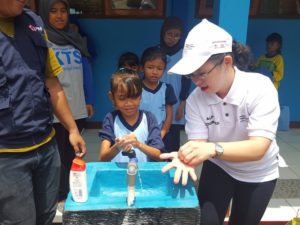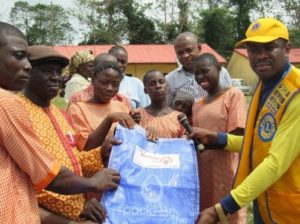Let’s Make Water, Sanitation and Hygiene Inclusive!
April 11, 2019
By: Kristin Hughes Srour, Special Olympics International
In Malawi, a group learns how to build a tippy tap and about the practice of washing hands with soap and water. In Nigeria, family members are provided Packs H2O backpacks to carry and store water. In Indonesia, Red Cross provides handwashing education to community members. In UAE, people at health education stations organized by Special Olympics hum the “Happy Birthday” song twice to help time washing their hands thoroughly with soap and water for 20 seconds.
What these examples have in common is an often neglected group – people with intellectual disabilities (ID). In each one of these instances, they received an opportunity to learn about water, sanitation and hygiene or WASH.
The Problem
Nearly 2.1 billion people alive today lack access to safe drinking water and 4.5 billion people are without access to safely managed sanitation.[i] Globally, diarrhea is the second leading cause of death among children under five, killing more children than malaria, AIDS and measles combined.[ii] It is estimated that 88% of diarrheal disease is caused by poor water, sanitation and hygiene.[iii] Yet, handwashing with soap alone can reduce incidence of diarrhea by more than 40%.[iv]
Although access to safe water and sanitation is a right included in the UN Convention on the Rights of Persons with Disabilities (CRPD) (Article 28 focuses on the right of people with disabilities “to an adequate standard of living for themselves and their families; this includes State Parties duty to ensure equal access to clean water services.” ), it is widely accepted that people with disabilities face particular challenges accessing safe water and sanitation.[v][vi] Not only are people with ID at increased risk of WASH-related disease, they are also less likely to receive the necessary treatment and care. This inequality in terms of access to safe water is an unjust life-and-death risk for people with ID.
There are a number of barriers that prevent people with ID from accessing water and sanitation resources, including stigma and discrimination, physical/structural barriers, and poor access to appropriate health and WASH education. On the rare occasion that disability is factored into WASH infrastructure designs, adaptations tend to focus on the needs of people with mobility issues. Very rarely does planning consider the needs of people with ID, especially tailored health literacy and education programs designed to reach individuals with ID, a disability subset with one of the lowest access-to-education rates in the world.[vii] As a result, people with ID may not receive the education or awareness on the need to practice hygiene and require outreach outside of schools and resources that can be understand by all, despite literacy levels.
In addition, since 1998 UNICEF and partners have promoted the WASH in Schools model. Considering an estimated 90% of children with disabilities in developing countries do not attend school , they are excluded from the benefits of these interventions.[viii]
Although much has been achieved in WASH programming over the past two decades, great disparities in water and sanitation access still exist and there is much to be done to reduce inequity among the poor as well as individuals and families of people with disabilities.
Finding Solutions
With inclusive programming in over 170 countries, and engaging over 5 million athletes, Special Olympics is a global inclusion movement using sport, health, education and leadership programs every day around the world to end discrimination against and empower people with intellectual disabilities.
Special Olympics Programs in Nigeria, Malawi and Uganda have used innovative programs to ensure sustainable WASH education for individuals with ID and their families. In Nigeria, in partnership with the UNICEF Nigeria Country Office, UNICEF specialists attend Special Olympics’ Family Health Forums and offer didactic and practical education programs for families on proper hygiene, proper sanitation, and ways to share this important information with their children. Special Olympics Uganda has held similar Family Health Forums on hygiene and cholera prevention. In partnership with the national Ministry of Health and village elders, Special Olympics Malawi has used the leadership and expertise of community health workers (CHWs) to provide ongoing WASH education and practice to children and adults with ID and their families. Special Olympics Malawi has also partnered with Catholic Relief Services and the Ministry of Education to deliver WASH education to children with ID and their family members at special schools in Lilongwe. At Special Olympics Healthy athletes events across the globe, handwashing is a core component to the health promotion education offered.
As we reflect on World Water Day and all the incredible progress being made globally, how will you do your part to ensure that people with disabilities are part of the solution? Will you join Special Olympics in our goal of #inclusivehealth?
Citations
[i] WHO/UNICEF Joint Monitoring Programme (JMP) Report 2017 update – See more at: https://www.who.int/news-room/detail/12-07-2017-2-1-billion-people-lack-safe-drinking-water-at-home-more-than-twice-as-many-lack-safe-sanitation
[ii] UNICEF/WHO, Diarrhoea: Why children are still dying and what can be done (2009).
[iii] Black RE, Morris S, Bryce J. Where and why are 10 million children dying every year? Lancet. 2003;361(9376):2226-34.
[iv] Curtis V & Cairncross S. Effect of washing hands with soap on diarrhea risk in the community: A systematic review. The Lancet Infectious Diseases 2003;3:275-81.
[v] Convention on the rights of persons with disabilities and optional protocol (2006). http://www.un.org/disabilities/convention/conventionfull.html
[vi] The state of the world’s children (2013): Children with disabilities. http://www.unicef.org/disabilities/files/Final_Flyer_WASH.pdf
[vii] Briefing note: What the Global Report on Disability means for the WASH sector (2013). https://washmatters.wateraid.org/publications/what-the-global-report-on-disability-means-for-the-wash-sector
[viii] http://portal.unesco.org/education/en/ev.php-URL_ID=32969&URL_DO=DO_TOPIC&URL_SECTION=201.html.
Photos courtesy of Special Olympics International.

